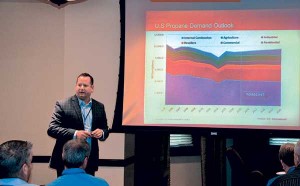PERC ag director: Marketers should seize on irrigation engine opportunity

Cinch Munson, director of agriculture business development for the Propane Education & Research Council, focuses on the benefits of propane irrigation engines.
Gallon growth was at the center of the LP Gas Growth Summit, which included a keynote address by Cinch Munson, director of agriculture business development for the Propane Education & Research Council.
Munson spotlighted several propane growth opportunities in the ag market, including greenhouse heat, animal heat and flame weeding. But he presented irrigation engines as a considerable opportunity on which retailers can seize.
According to Munson, about 6,000 diesel-powered irrigation engines will need to be replaced annually over the next 20 years. That’s an opportunity for propane retailers, he says.
“There’s no reason propane-powered engines can’t replace at least half of these,” says Munson, adding that the upfront propane equipment costs are 30 to 50 percent lower and that the ongoing savings could top $3,000 per engine per year.
The opportunity is great because propane’s share of the irrigation engine market is considerably low. Electricity dominates this space with more than 70 percent market share, according to the U.S. Department of Agriculture’s (USDA) 2013 Farm and Ranch Irrigation Survey.
“As electric rates continue to go up, there’s potential to capture some of that [market share],” Munson says.
 LP gas (propane and butane) represents 2.2 percent of the irrigation engine market, according to USDA. Diesel and biodiesel make up about 20 percent of the market, and natural gas represents about 5 percent of the market.
LP gas (propane and butane) represents 2.2 percent of the irrigation engine market, according to USDA. Diesel and biodiesel make up about 20 percent of the market, and natural gas represents about 5 percent of the market.
Munson says converting farmers from diesel, which has about 123,000 irrigation engines in the field, offers the bigger opportunity than electric conversions.
“The good thing is we have a lot of market share we can capture,” he says.
Munson adds that each propane irrigation engine consumes between 4,000 and 12,000 gallons of fuel per year. Those gallons can be burned during the industry’s off-peak summer months, he says.
“One irrigation engine will use about as much as five to 10 houses,” Munson says.
Of course, gallon sales related to irrigation engine sales aren’t available to every propane retailer. But the opportunity is available to a majority of retailers, Munson says.
“California is a huge market,” he says. “They had almost no engines just a few years ago. Now, I’ve known personally of at least as many engines sold in the past year as [the state] had five years ago.”
The Mississippi Delta is yet another region where propane-powered irrigation engines can gain traction.
“There are a lot of diesel engines there,” Munson says. “If they’re going to buy a diesel engine to irrigate their crops, shame on us as an industry. There are no reasons I can find why someone should buy a diesel engine, in my opinion.”
Photo: PERC
















